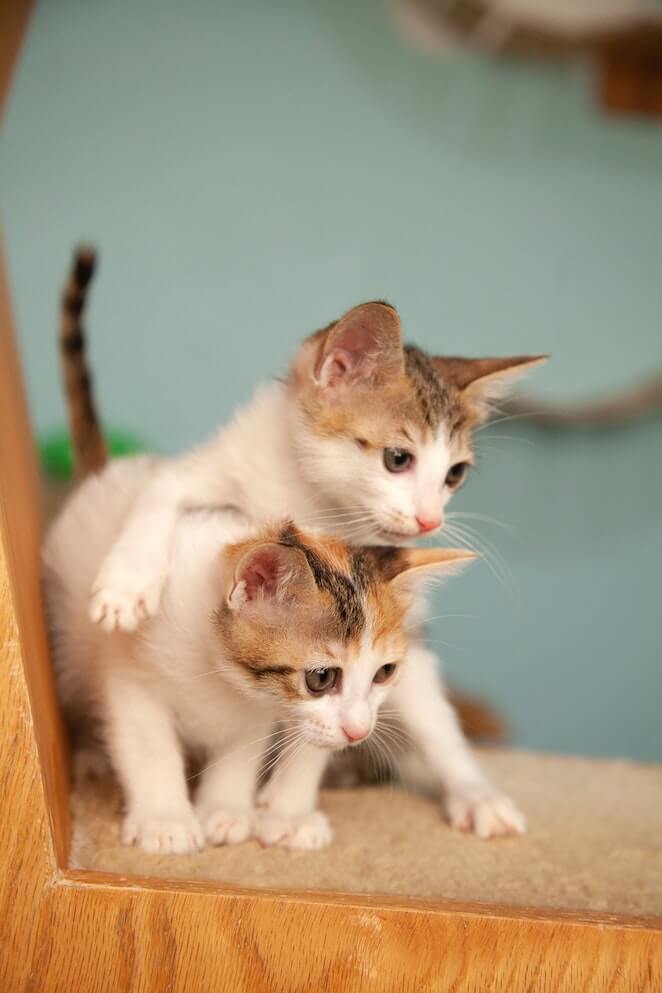
So you’ve decided to bring a furry friend into your home. Congratulations!
Now comes the most important decision of all: should you get a male or female cat?
Both have their advantages and disadvantages, so let’s take a look at what they have to offer.
Should You Get A Male Or Female Cat?
The age-old debate of “male or female cat” has been around since cats were first domesticated.
It’s a tough call, and the answer depends on your lifestyle and preferences.
Some people prefer male cats because they tend to be more laid back and docile than female cats.
On the other hand, some people enjoy the company of an active, playful female cat.
Ultimately, it comes down to what type of personality fits best with yours! For that, you should also ask yourself some questions that will make you ready to become a cat parent.
Here are a few parameters based on which you can make your decision.

Size
Male cats tend to be larger than female cats, but not always – it all depends on the breed and age of the cat.
An adult male cat can weigh up to 20 pounds while a female cat can be as small as 8 or 9 pounds.
Even though they may look cuddly and cute, some male cats are strong enough to compete with smaller dogs in weight-lifting contests!
Temperament
Male cats and female cats both have distinct personalities, but how do their temperaments compare? As it turns out, felines of the opposite sex typically display some pretty divergent characteristics.
Male cats tend to be more outgoing and curious than females.
They are often found exploring new places and trying out different activities.
However, they can also become easily overwhelmed by too much stimulation – so don’t forget to give them a break when needed!
On the other hand, female cats tend to be more independent and reserved in comparison. They will often take a more leisurely approach to life, preferring comfort over adventure.
Reproduction
Male cats don’t get their first chance to start reproducing until they reach sexual maturity around six to nine months of age, while female cats can begin as early as five months old!
That’s right – when it comes to reproduction, female felines have a head start over their male counterparts.
But having an earlier start isn’t everything; female cats also take fewer breaks from reproducing than males do.
A female cat can produce multiple litters each year, whereas male cats typically take seasonal breaks from the mating season.
When talking about reproduction, its control also needs to be considered by their owners.
For male cats, neutering helps reduce the risk of certain diseases such as testicular cancer and prostate problems.
It also decreases aggressive behavior like fighting with other males. Neutered males may still guard their territory but typically have less testosterone-fueled aggression than unneutered cats.
Female cats benefit from spaying too!
Spaying your female cat decreases the risk of uterine infections, mammary cancer, and life-threatening pregnancy complications. If your kitty’s a bit temperamental, spaying can also reduce her aggression.
Health
When it comes to health, cats are typically known for their resilient nature, but there are some key differences between male and female felines.
Male cats tend to develop fewer illnesses and overall require less medical attention than females do.
Although they may boast a hearty constitution, males can be prone to urinary tract infections, whereas females have a greater risk of developing mammary tumors or cystic ovaries. It is one of the common health problems in cats.
Is it Better to Have a Male or Female cat?

Let’s discuss some of the pros and cons of both sexes of cats:
Pros of male cats
- Male cats are generally more playful, making them perfect companions for people who want an active pet.
- Male cats often feel less threatened by other animals and humans, enabling them to be better socialized than their female counterparts in unfamiliar environments.
- These cats tend to prefer being around humans more than females do, making them ideal for owners who enjoy spending time with their furry friends.
- Males are typically neater groomers than female cats, so they require less grooming overall which makes it easier to keep up with hygiene and fur maintenance.
- Males are also less prone to spraying, which can make them better house pets for owners who don’t want the smell of cat urine in their homes.
Cons of male cats
- Male cats are more likely to roam and wander than female cats, which can lead to them getting lost, injured, or even killed if they explore too far.
- Male cats tend to be more aggressive when compared to females, meaning they may not react well to other pets or children in the household.
- These cats may spray urine as a way of marking their territory, resulting in unpleasant odors throughout the home.
- Neutering is pivotal for male cats as it curbs many unwanted behaviors such as roaming and spraying; however, there are associated costs for spaying that may be an issue for some owners.
- Many people find male cats harder to bond with due to their tendency to be more aloof and independent compared to female cats. This means they may not always be as affectionate or responsive to their owners.
Pros of female cats
- Female cats are known to be more affectionate and open to human touch compared to male cats.
- They tend to be quieter than male cats, making them ideal for households with children or in apartments.
- As they are smaller in size, they require less space and food compared to their male counterparts.
- Female cats typically have a better tolerance for other animals and pets, meaning they could make good additions to already existing pet families.
- Spaying female cats also guarantee fewer unwanted litters, as well as reduces the risk of uterine infections and breast cancer. This ultimately helps to promote better health in female cats.
Cons of female cats
- Female cats are more vocal than male cats and generally make more noise, so if you’re not a fan of loud meows, then female cats are probably not the right pets for you
- Female cats can be prone to spraying urine to mark territory – something most owners would want to avoid!
- Female cats often experience false pregnancies which can lead to behavioral issues like changes in mood or even aggression toward other animals or people.
- Furball season is especially intense with female cats because they shed more fur than males do; this means more frequent grooming sessions and a higher chance of hairballs!
- Spaying your cat early is important for her health but can also cause physical discomfort during recovery and a loss of energy. This can make it difficult to give her the exercise she needs and could lead to obesity if not closely monitored.
In Conclusion

Ultimately, the decision on whether to get a male or female cat comes down to the individual.
Both males and females can make wonderful, loyal companions with plenty of love and affection to offer.
Consider both sexes when making your decision – ask breeders, shelters, and friends who have cats for their opinion before you make your choice.
Once you’ve done the research and made up your mind, there’s no doubt that you will find joy in whichever pet you choose!
You can choose from the most popular cat breeds that most people love.
No matter which sex you decide upon for your kitty companion, having a furry feline around can be an incredibly rewarding experience.

- 7 Dog Breeds With Webbed Feet And Why Do They Have Them - July 19, 2023
- 10 Best Fish For Small Tanks That Make Perfect Pets - July 18, 2023
- How to Breed Guinea Pigs: A Detailed Guide - July 17, 2023


GIPHY App Key not set. Please check settings